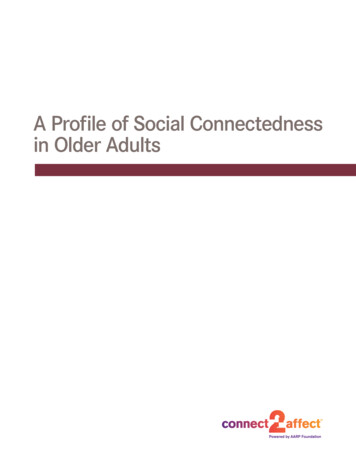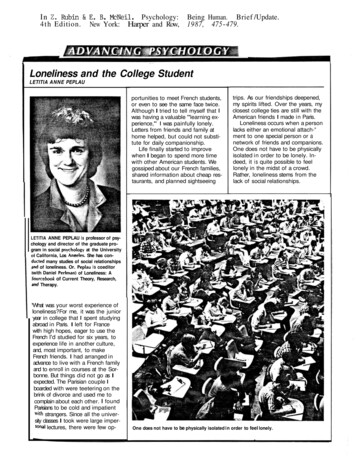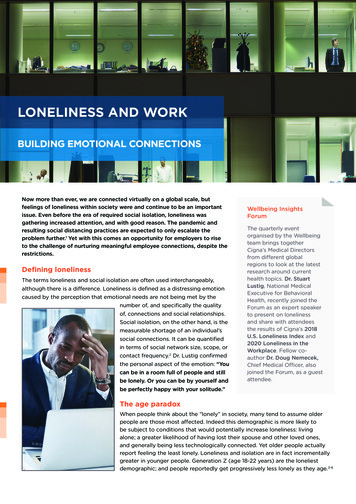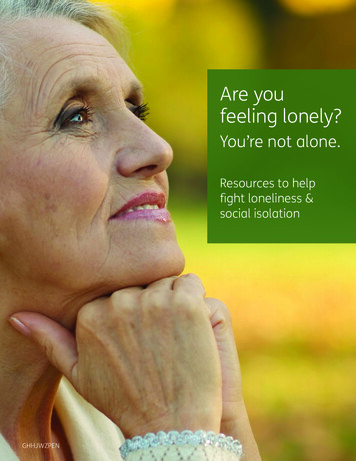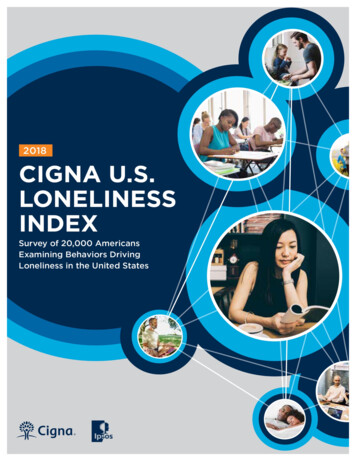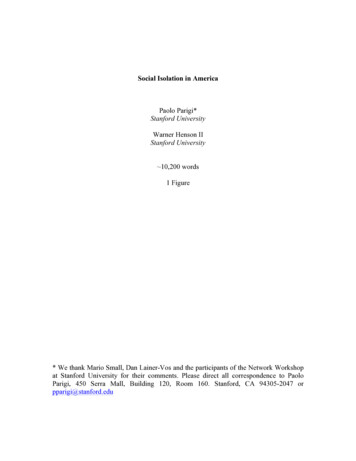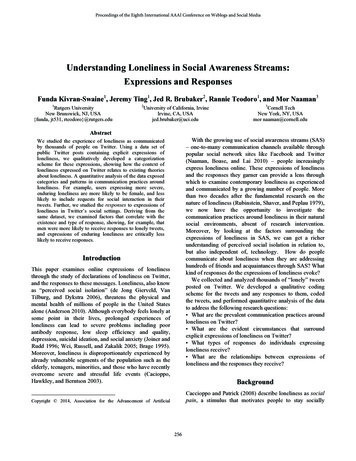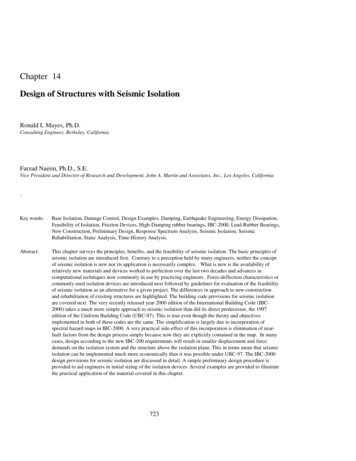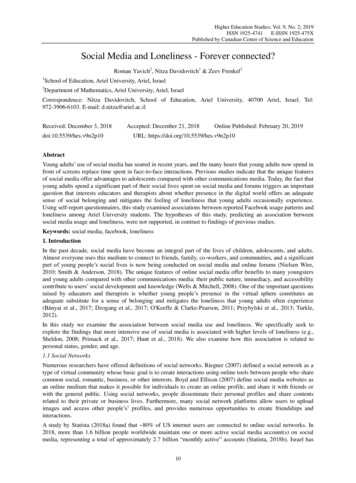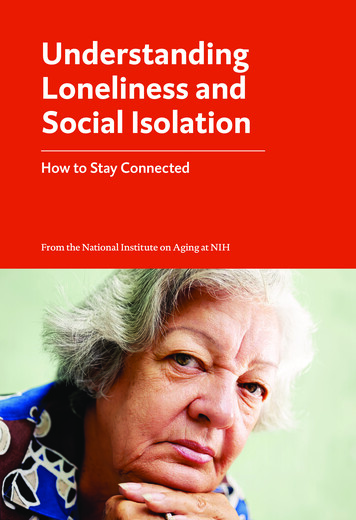
Transcription
UnderstandingLoneliness andSocial IsolationHow to Stay ConnectedFrom the National Institute on Aging at NIH
Table of ContentsIntroduction . . . . . . . . . . . . . . . . . . . . . . . . . . . . . . . . . . . . 3What are Loneliness and Social Isolation? . . . . . . . . 5How Can Being Isolated or Feeling LonelyAffect a Person’s Health? . . . . . . . . . . . . . . . . . . . . . . . . . 8How Do I Know if I Am at Risk? . . . . . . . . . . . . . . . . . . 13What Can I Do To Stay Connected? . . . . . . . . . . . . . . 19For More Information . . . . . . . . . . . . . . . . . . . . . . . . . . 24Words To Know . . . . . . . . . . . . . . . . . . . . . . . . . . . . . . . . 30Use the Table of Contents to help you find thingsquickly. Page 24 has a list of resources for moreinformation about loneliness and social isolation.We also put some medical terms in bold, such asinflammation. You can find how to say these wordsand what they mean in the “Words To Know”section on page 30.
IntroductionAs people age, they often find themselves spending moretime alone. This can affect your health and well-being.Everyone needs social connections to survive and thrive.This booklet will help you learn aboutloneliness and social isolation: What they are Health effects Risk factors How to stay connected if you or someone you loveis isolated or feeling lonely3
Marvin’s StoryAfter working 35 years as a teacher, Marvin lookedforward to an active retirement with his wife, Sandra. Formany years, they enjoyed traveling, spending time withtheir grandchildren, and socializing with friends. ThenSandra developed breast cancer and passed away. Marvinhad a difficult time coping with her death and didn’t feellike socializing with their friends or going out to dothings on his own.4
What Are Loneliness andSocial isolation?The number of older adults age 65 and older is growing,and many are socially isolated and regularly feel lonely. Thecoronavirus outbreak in 2020 brought even more challengesdue to health considerations and the need to practicephysical distancing.Social isolation and loneliness are different, but related.Social isolation is the lack of social contacts and havingfew people to interact with regularly. Loneliness is thedistressing feeling of being alone or separated. It’s possible tofeel lonely while among other people, and you can live aloneand not feel lonely or socially isolated.Older adults are at higher risk for social isolation andloneliness due to changes in health and social connectionsthat can come with growing older, hearing, vision, andmemory loss, disability, trouble getting around, and/or theloss of family and friends.5
If you are in poor health, you may be more likely to besocially isolated or lonely. And, if you are socially isolatedor feeling lonely, it can also put your physical and mentalhealth at risk.Adults who are lonely or socially isolated are less healthy,have longer hospital stays, end up readmitted to the hospitalmore often, and are more likely to die earlier than those withmeaningful and supportive social connections.6
Staying Connected During COVID-19With the COVID-19 pandemic (global outbreak),maintaining safe distancing precautions has beenchallenging for everyone — even people who areotherwise well-connected with large supportivesocial networks.Public health guidelines to keep physical distance fromothers have slowed down the spread of COVID-19,but they have also made it harder for people to seefamily and friends. Older adults are at greater risk ofCOVID-19, but it is also critically important for themto maintain active social connections. Reach out byphone, video, text, social media, email, or letter to helpeveryone stay connected during this challenging time.Learn more at www.coronavirus.gov.7
How Can Being Isolated orFeeling Lonely Affecta Person’s Health?People who are socially isolated or lonely are more likelyto be admitted to nursing homes and the emergency room.Social isolation and loneliness also are associated withhigher risks for: High blood pressure Depression Heart disease Cognitive decline Obesity Dementia, includingAlzheimer’s disease Weakened immunefunctioning Death AnxietyPeople who are lonely or socially isolated may get too littleexercise, drink too much alcohol, smoke, and oftendon’t sleep well, which can increase the risk of heartdisease, diabetes, obesity, high blood pressure, and otherserious conditions.8
People who are lonely experience emotional pain. Losinga sense of connection and community can change the waya person sees the world. Someone experiencing chronicloneliness can feel threatened and mistrustful of others.Emotional pain can activate the same stress responses in thebody as physical pain. When this goes on for a long time, itcan lead to chronic inflammation and reduced immunity.This raises your risk of chronic diseases and can leave aperson more vulnerable to some infectious diseases.Social isolation and loneliness may also be bad for brainhealth. Loneliness and social isolation have been linked topoorer cognitive function and higher risk for dementia,including and especially for Alzheimer’s disease. Also,little social activity and being alone most of the time maycontribute to a decline in the ability to perform everyday taskssuch as driving, paying bills, taking medicine, and cooking.9
Tips for Staying Connected if You AreLiving Alone With DementiaIf you or a loved one has dementia and lives alone, familymembers, friends, or other caregivers may be able to help indifferent ways. Identify a person you trust, such as a neighbor, whocan visit you regularly in-person or via a video call, and bean emergency contact. Learn about home- and community-based supportand services from social service agencies, localnonprofits, and Area Agencies on Aging. Stay connected with family and friends throughvideo chats, email, and social media. If you’re not techsavvy, ask for help to learn. Talk with others who share common interests.Try a support group online or in person. Maybe yourcommunity has a memory café you can visit — a safe placeto enjoy activities and socialize for people living withmemory loss and their families and caregivers.10
COVID-19 PrecautionsDuring the COVID-19 pandemic, take precautions toprotect yourself and others. Wash your hands often withsoap and water or use a hand sanitizer if soap and waterare not available. Stay at least 6 feet from people who arenot in your household. Cover your mouth and nose witha cloth face mask when around others. Always coveryour mouth and nose with a tissue when you sneezeor cough, or use the inside of your elbow if you do nothave a tissue. Frequently clean and disinfect surfacesthat you frequently touch each day. Stay at home whenyou feel ill. Read more at www.coronavirus.gov.11
Elena’s StoryElena has been her father Oscar’s caregiver ever sincehe was first diagnosed with Alzheimer’s disease. AsOscar’s condition has worsened, Elena must do more tohelp, including helping him with bathing and dressing,taking him to the doctor, and preparing his meals. Whileshe feels lucky to be caring for Oscar, Elena often feelsoverwhelmed and distant from her friends. She no longerhas time to spend with them and is often too tired to do soeven if she could.12
How Do I Know if I Am at Risk?Those who find themselves unexpectedly isolated due tothe illness of a loved one, separation from friends or family,loss of mobility, worsening vision or hearing problems,disability, or lack of mobility or access to transportation, areat particular risk of loneliness and social isolation.You also may be at greater risk if you: Live alone Can’t leave your home Had a major loss or life change, such as the deathof a spouse or partner or retirement Struggle with money Are a caregiver Have psychological or cognitive challenges Have limited social support Live in a rural, unsafe, and/or hard-to-reachneighborhood Have language barriers where you live Experience age, racial, ethnic, sexual orientation, and/orgender identity discrimination where you live Are not meaningfully engaged in activities or are feelinga lack of purpose13
Hearing Loss Can Make It HarderTo Stay ConnectedPeople with hearing loss may find it hard to haveconversations with friends and family.Many older adults have difficulty hearing, butsome may not want to admit it. Those who can’thear well may withdraw from others because theyfeel frustrated, become depressed, or embarrassed.Sometimes, older adults are mistakenly thought to beconfused, unresponsive, or uncooperative when thereality is that they don’t hear well.Difficulties communicating with others can lead to lessinteraction with people, social isolation, and higherrates of loneliness.Hearing problems that are ignored or untreated can getworse. If you have a hearing problem, see your doctor.Hearing aids, special training, certain medicines, andsurgery are some of the treatments that can help. Readmore at 14
Dealing with Grief, Mourning,and DepressionAlthough it is normal to mourn when you have a loss,later life does not have to be a time of ongoing sadness ordisconnection. Depression is a common problem amongolder adults, but it is not a normal part of aging. It istreatable, so let your doctor know about your feelings andask about treatment.It is especially important to get help with your loss to helpprevent you from feeling overwhelmed. If you feel sad allthe time, are unable to imagine life moving forward withoutyour loved one, experience a general loss of interest in thingsyou used to like to do, or if your sense of loss keeps you fromdoing your daily activities, let your doctor know. Also, tellyour doctor about symptoms such as lack of energy, poorappetite, trouble sleeping, or little interest in life. Thesecould be signs of complicated grief or depression, both ofwhich can be treated.Family and caring friends often can provide great support.There are also support groups where grieving people helpeach other. Also, remember to take good care of yourself:Try to eat well, exercise, get enough sleep, and do activitiesyou enjoy.15
Talking With Your DoctorIf you are feeling isolated or lonely a lot of the time, you maywant to tell your doctor or health professional. Talking aboutyour health with your doctor means sharing informationabout how you feel physically, emotionally, and mentally.Describing your symptoms can help your doctor identify theproblem. Make sure to bring up your concerns. For example,let your doctor know about any major changes or stresses inyour life, such as a divorce or the death of a loved one.As we grow older, we may lose people in our lives, includingspouses and cherished friends. Or, we may have to moveaway from home or give up favorite activities. A doctor whoknows about your losses is better able to understand howyou are feeling. They can make suggestions that may behelpful to you.16
Be open and honest with your doctor about your healthhabits and what’s happening in your life. It will help themto understand your medical conditions and emotionalhealth more fully and recommend the best treatmentoptions for you. Learn more about doctor-patientcommunication at www.nia.nih.gov/twyd.Think You Might Be at Risk?Check out this resource to learn more about lonelinessand social isolation and take a quiz to see if you mightbe at risk for loneliness or social isolation: ExpandingYour Circles: Prevent Isolation and Loneliness as youAge, es/docs/Expanding-Circles.pdf17
Carla’s StorySince Carla started having trouble with her vision, she’shad to give up driving and travels less often. But shestill enjoys spending time with her three grandchildren,even though she lives in Maryland and they live acrossthe country in California. Carla reads stories to them onvideo chat and catches up on how they are doing on socialmedia. She also stays in touch with friends through emailand weekly phone calls. Carla feels much happier knowingthat she can stay connected with others.18
What Can I Do To StayConnected?There are things you can do to protect yourself or a loved onefrom the effects of loneliness and social isolation. First, it’simportant to take care of yourself. Exercise, eat healthy, getenough sleep, and pursue activities you enjoy to help managestress and stay as mentally and physically healthy as possible.It’s also important to stay active and connect with others.People who engage in meaningful, productive activities theyenjoy with others feel a sense of purpose and tend to livelonger. Studies show these activities may help boost yourmood and improve your well-being and cognitive function.People who live an active lifestyle: Are less likely to develop certain diseases Have a longer lifespan Are happier and feel less depressed Are better prepared to cope with loss May be able to improve their thinking abilitiesFor example, helping others through volunteering helps youfeel less lonely and allows you to have a sense of mission andpurpose in life, which is linked to better health.19
Here are some other ideas to help you stay connected:* Find an activity that you enjoy, restart an old hobby, ortake a class to learn something new. You might have funand meet people with similar interests. Schedule time each day to stay in touch with family,friends, and neighbors in person, by email, social media,voice call, or text. Talk with people you trust and shareyour feelings. Suggest an activity to help nurture andstrengthen existing relationships. Sending letters or cardsis another good way to keep up friendships. Use communication technologies such as video chat,smart speakers, or even companion robots to help keepyou engaged and connected. If you’re not tech-savvy, sign up for an online or in-personclass at your local public library or community center tohelp you learn how to use email or social media. Consider adopting a pet if you are able to care for them.Animals can be a source of comfort and may also lowerstress and blood pressure.20
Stay physically active and include group exercise, suchas joining a walking club or working out with a friend.Adults should aim for at least 150 minutes (2 1/2 hours)of activity a week that makes you breathe hard. Introduce yourself to your neighbors. Find a faith-based organization where you can deepenyour spirituality and engage with others in activitiesand events. Check out resources and programs at your local socialservice agencies, community and senior centers, andpublic libraries. Join a cause and get involved in your community.*See page 11 for information to help you stay safe during theCOVID-19 pandemic.21
The Benefits of ExerciseIf you’re feeling down, anxious, or stressed because youare lonely or isolated, one way to boost your mood is to getmoving through exercise. Research has shown that exerciseis not only good for your physical health; it also supportsemotional and mental health. You can exercise with a friendand get the added benefit of emotional support.Physical activity can help: Reduce feelings of depression and stress, while improvingyour mood and overall emotional well-being Increase your energy level Improve sleep Empower you to feelmore in control22
In addition, exercise and physical activity may possiblyimprove or maintain some aspects of cognitive function.Whether it’s gardening, playing tennis, taking a walk in thepark, kicking around a soccer ball with your grandchildren, orsomething else, choose an activity you enjoy.**See page 11 for information to help you stay safe during theCOVID-19 pandemic.There are many things you can do to stay connected asyou age. By staying active, participating in meaningfulactivities you enjoy, and maintaining relationshipswith others, you can help keep your brain active,avoid health problems, and feel less isolated and moreengaged with the world around you.23
For More InformationFederal Government ResourcesNIA Alzheimer’s and related Dementias Educationand Referral (ADEAR) Center800-438-4380 mersThe National Institute on Aging’s ADEAR Center offersinformation and publications for families, caregivers, andhealth professionals on Alzheimer’s disease and relateddementias, including information on caregiving, clinicaltrials, and research. Staff members answer inquiries byphone, email, and in writing and make referrals to local andnational resources. Visit the ADEAR website to learn moreabout Alzheimer’s and related dementias, find clinical trials,and sign up for email updates.AmeriCorps Seniors800-942-2677https://americorps.govSenior Corps is a network of national service programsfor Americans age 55 and older, made of three primaryprograms: Senior Companions, Foster Grandparents, andRSVP. Senior Corps volunteers commit their time to addresscritical community needs including academic tutoring andmentoring, elderly care, disaster relief support, and more.24
Eldercare Locator800-677-1116 re.acl.govThis service of the Administration on Aging, of theAdministration for Community Living, can help you findhousing, support services, transportation, health andinsurance, and benefits information in your local community.Other ResourcesAARP888-687-2277 (toll-free)877-434-7598 ingAARP provides resources and guidance for family caregiverson social isolation, in-home care, medical, financial, and legalconsiderations, and caregiver well-being.Alzheimer’s Association800-272-3900 (toll-free)866-403-3073 (TTY/toll-free)info@alz.orgwww.alz.orgThe Alzheimer’s Association provides information andsupport for people with Alzheimer’s disease and theircaregivers including a 24-hour helpline for confidentialsupport and information for those living with Alzheimer’sdisease, caregivers, families, and the public.25
fect is an online resource to address socialisolation and loneliness and increase awareness. It featurestools, training resources, and information to help evaluateisolation risk and create networks.Isolation lfThis assessment can be done by an individual or acaregiver to help gauge how connected the person is. Italso provides suggestions for resources that may help.Family Caregiver Alliance800-445-8106 (toll-free)info@caregiver.orgwww.caregiver.orgThe Family Caregiver Alliance provides services to familycaregivers of adults with physical and cognitive impairments,such as Parkinson’s, stroke, Alzheimer’s and other types ofdementia, including assessment, care planning, direct careskills, wellness programs, respite services, and legal/financialconsultation vouchers.Meals on Wheels America888-998-6325 nwheelsamerica.orgMeals on Wheels America provides home meal deliveryservices to people who have trouble getting out of their homes.26
National Association of Area Agencies on Aging202-872-0888info@n4a.orgwww.n4a.orgThis national network of Area Agencies on Aging providesresources and information for older adults and people withdisabilities on health, safety, and staying connected.National Council on Aging571-527-3900www.ncoa.orgThe National Council on Aging partners with nonprofitorganizations, government, and businesses to provideinnovative community programs and services, online help,and advocacy.Center for Healthy www.gerifit.comHealthy ed-programs/healthy-movesFit & Strong!www.fitandstrong.org27
SilverSneakers866-584-7389 (toll comSilverSneakers is a community fitness program for olderadults that offers offers exercise classes, workouts,how-to videos, and he YMCA offers evidence-based group exercise programsfor older adults to improve fitness and prevent falls.28
To Learn More AboutHealth and AgingNational Institute on Aging Information Center800-222-2225 (toll-free)800-222-4225 it www.nia.nih.gov/health to find more health and aginginformation from the National Institute on Aging at NIH andsubscribe to email alerts. Visit https://order.nia.nih.govto order free print publications.29
Words To KnowAlzheimer’s Disease(pronounced allz-high-merz duh-zeez)A disease that causes large numbers of nerve cells in the brainto die. People with this disease lose the ability to remember,think, and make good judgments. The symptoms beginslowly and get worse over time.Chronic(pronounced kron-ik)A condition that continues for a long time or recursover time.Cognitive Decline(pronounced kog-ni-tiv dih-klahyn)A medical condition that causes people to have morememory problems than other people their age. The signs arenot as severe as those of Alzheimer’s disease. They includeforgetting to go to events and appointments, and havingmore trouble coming up with the right words than otherpeople the same age.Complicated Grief(pronounced kom-pli-key-tid greef)A condition in which people who have lost a close loved onemay be unable to comprehend the loss, experience intense,prolonged grief, and have trouble resuming their own life.30
Dementia(pronounced duh-men-shuh)A loss of cognitive functioning. This means changes to aperson’s thinking, remembering, reasoning, and behaviorthat make daily life and activities difficult to manage.Immunity(pronounced ih-myoo-ni-tee)The ability to resist or fight off a disease.Inflammation(pronounced in-fluh-mey-shuhn)Inflammation includes heat, swelling, and redness causedby the body’s protective response to injury or infection.Inflammation that occurs in healthy tissues or lasts too longcan be harmful.Loneliness(pronounced lohn-lee-nes)The distressing feeling of being alone or separated.Physical Distancing(pronounced fiz-i-kuhl dis-tuhns-ing)The act of keeping a safe space between yourself and otherpeople who are not from your household. To practice physicaldistancing, stay at least 6 feet (about 2 arms’ length) fromother people in both indoor and outdoor spaces who are notfrom your household.Social Isolation(pronounced soh-shuhl ahy-suh-ley-shuhn)The lack of social contacts and having few people to interactwith regularly.31
32
Share this booklet with friends and family so they canunderstand more about loneliness and social isolationand staying connected.33
National Instituteon AgingNIH Publication No. 20-AG-8150November 202034
This raises your risk of chronic diseases and can leave a person more vulnerable to some infectious diseases. Social isolation and loneliness may also be bad for brain . health. Loneliness and social isolation have been linked to poorer cognitive function and higher risk for dementia
